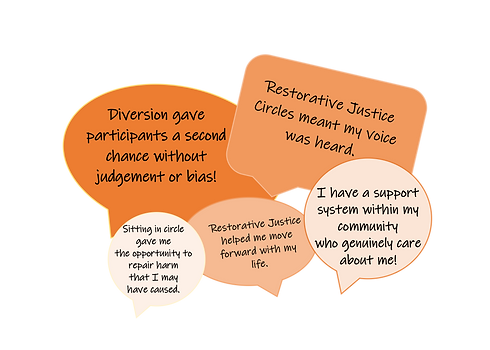ADULT & YOUTH
DIVERSION PROGRAMMING


In Partnership with St. Paul Attorney's ETHOS program, DRC community volunteers hold restorative conversations between individuals who have committed a misdemeanor or low/high-level felony offenses and those impacted by the crime to discuss the incident and determine resolution. Individuals participate in “community circles of support”, creating alternative sentencing options and a restorative justice process that strengthens accountability and opens a line of communication between the offender and those harmed. Individuals who complete the program are able to keep a conviction off their record, avoid fines, and minimize contact with the justice system. Completing the process can lead to a reduction of barriers that could prevent behavior change and future success.
WHAt Is DIVERSION?
Also known as a Pretrial Diversion or Intervention Program, Diversion within the Criminal Justice System is a form of pretrial sentencing in which a low/high-level offender (participant) joins a voluntary rehabilitation program. As a solution to the original arrest, The City of St. Paul’s Office of Attorneys (SPAO) and Restorative Justice Community Action (RJCA) in partnership with DRC offer support using restorative circles to prevent conviction and potential recidivism for the offender (participant) to avoid a criminal record.
WHY DIVERSION PROGRAMMING?
#1
SECOND CHANCE
ability to give participants a second chance
#2
SAFE SPACE
arranges a safe space to be free from judgement or bias
#3
No Court
reduces the need for courts within the justice system
#4
REAL SOLUTIONS
provides tools and alternate solutions for participants to apply in the future
aDULT DIVERSION PROGRAMMING
ETHOS is a St. Paul initiative created by the St. Paul City Attorney’s Office (SPCAO) as part of a broader plan to address misdemeanor and gross misdemeanor crimes (theft, gun possession, fighting, DUI's...) for people 18 years of age and up through innovative approaches to achieving meaningful, restorative, equitable justice.


Gun DIVERSION PROGRAMMING
The goal for gun diversion is to keep low-level, non-violent gun offenders from re-entering the criminal justice system by offering them an alternative to conviction and sentencing. This pilot program aims to address the issue of non-violent gun offenders re-entering the criminal justice system by providing an alternative to conviction and sentencing. The program recognizes that many individuals illegally carry/possess firearms for a variety of reasons other than to commit violent crimes. The goal of this program is to identify and to address those underlying factors as they relate to each individual charged with a low-level, non-violent gun offense. The program targets young, low-level offenders who have recently become involved in the criminal justice system with a non-violent gun charge.
THE 4 C'S For Diversion
#1
COMMITMENT
#2
COMMUNICATION
#3
CONSISTENCY
#4
CREATIVITY

YOUTH DIVERSION PROGRAMMING
Giving Real Opportunities (The GRO Initiative) is a collaborative effort of the Dispute Resolution Center (DRC) and Restorative Justice Community Action (RJCA) to address criminal offenses using the restorative circle process for youth 10 to 17 years of age.
The Circle Process:
Circle Keepers & Community Members
Community
Mediation
Training 101
Diversion cannot happen without DRC-certified trained volunteers!
Circle Keepers (CK) who keep and lead the circle, and Community Members (CM) who help support participants with their cases, assist in making the circle process safe and comfortable for all participants. These are paid positions. You may waive your payment and donate it to Restitution to help participants who may owe money to their victims. All Cases require participants to engage in a 2-hour restorative circle process consisting of the following:
1st Hour: Building relationships with participants embracing race, culture, and intergenerational differences. (This hour includes introductions, creative thinking, activities, and storytelling).
2nd Hour: Accountability. All participants work closely with CK, CM, and additional circle of supporters (family & friends) to reach an agreement for moving forward in a positive way that promotes healing, forgiveness, and realistic action steps to repair the harm.
Next Steps: Once an agreement has been settled and signed off, cases go back to The City's St. Paul Attorney's Office or Ramsey County Attorney's Office for review of dismissal or expungement. No jail time. No Judgment. Just shifting the negative narrative within the criminal justice system to be fair and equitable.
#Facts: For five years DRC has supported over 500 diversion cases. Data shows there has been less than 3% recidivism with participants re-offending. Restorative circles of support have been proven to transform relationships in REAL time!
Diversion circles meet both virtually and in person. If you are interested in being trained as a Community Member for Diversion please complete and submit a volunteer intake form HERE. If interested in learning more please email:
Adult- restorative@drc-mn.org or Juvenile - drcyouth@drc-mn.org
